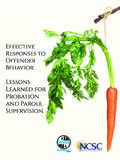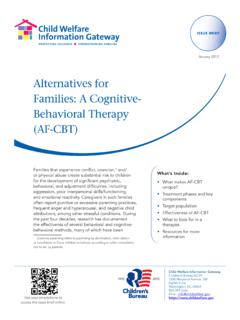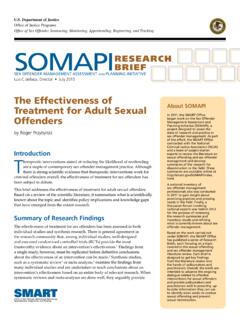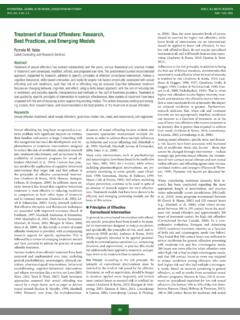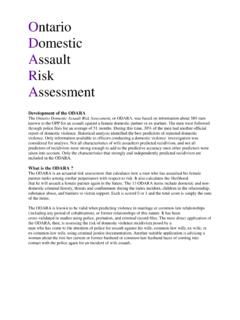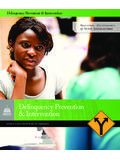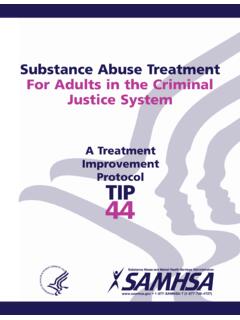Transcription of SUNDAY MONDAY TUESDAY WEDNESDAY 1/30 1/31 2/1 2/2
1 SUNDAY 1/30 MONDAY 1/31 TUESDAY 2/1 WEDNESDAY 2/2 Intensive Sessions First Time Attendee & Membership Meeting Opening Plenary Reception in Expo Hall Yoga Session Coffee Reception in Expo Hall Workshops Plenary Lunch Break on Your Own Special Session Workshops Cocktail Hour Yoga Session Workshops Coffee Reception in Expo Hall Workshops Job Fair Lunch Break on Your Own Workshops Special Session: Community Corrections Reform Workshops Workshops Closing Plenary NOTE: Leadership Institute will take place on Friday 1/28 SUNDAY 1/30. Committee Meetings will take place on SUNDAY 1/30 - MONDAY 2/1. BOD Meeting will take place on SUNDAY 1/30. Intensive Sessions (Additional Fee With Registration) Behind Closed Doors: What Really Happens in a DWI Treatment Court Born out of the drug court movement, DWI courts aim to change behavior, restore lives, and protect public safety.
2 There are now well over 700 DWI courts in jurisdictions all around the country, many of whom boast incredible successful completion rates, reductions in recidivism and crashes, and save taxpayer dollars. To achieve those outcomes, have you ever wondered what really goes on in a DWI court? For DWI court practitioners, have you ever wondered if what goes on behind your closed doors is similar to other programs? This session will reveal what needs to occur in a DWI court to maintain fidelity to the model. A case study, from arrest to successful completion, will be used to highlight evidence-based practices supporting the 10 Guiding Principles, effective treatment and supervision case management, judicial interaction, team collaboration, and phase structure of DWI courts.
3 Change Perceptions Through Persuasive Communication This interactive and engaging workshop will provide the attendees with the ability to strengthen their communication skills. The intent of the course is to enhance the communication skills of attendees at all levels. This is an interactive program based on experiential learning techniques. This course focuses on persuasive communication skills outside the department through community communication, communication skills within the department, and personal communication skills to further develop leadership. When a supervisor or commanding officer has strong communication skills, personal growth of the officer, the reputation of the department and the profession are enhanced. Fraud Awareness: Prevention, Detection, and Managing the Message The intensive session will introduce participants to the fundamental aspects of occupational fraud to include: why people commit fraud; how fraud occurs (most common schemes); best practices in prevention and detections; and, specific case studies in which community supervision staff have committed fraudulent acts.
4 (This course is currently being taught throughout Texas and is incredibly well received!) Impaired Driving Assessment Certification Training This event will provide participants with the knowledge and skills to properly administer and use the Impaired Driving Assessment (IDA) with supervisees convicted of an impaired-driving offense. Upon completion, participants will gain full access to all IDA materials to use with supervisees within their respective jurisdictions. The IDA acts as a screener to provide an estimate risk level among supervisees, identify their potential service needs, assess their responsivity to intervention efforts, and considers the degree to which their behaviors have compromised traffic and public safety. It was developed by APPA in collaboration with experts in the assessment field with support from the National Highway Traffic Safety Administration.
5 Understanding Sexual Orientation, Gender Identity and Expression (SOGIE) for Justice Involved Individuals This session will highlight how we as Probation should be working with this community and how we can be both allies and supports for the LGBTQ+ community. Presenters will share how this training initiative in Nebraska State Probation has been implemented to create an inclusive organization. This is a foundational training for increased knowledge about SOGIE issues and will lead to safe, inclusive, affirming and welcoming environments for all LGBTQ+ individuals who are justice involved. LGBTQ individuals are overrepresented in both the prison and probation populations. There are a number of factors that impact how individuals identifying as LGBTQ+ are brought to the attention of the justice system.
6 WORKSHOPS (Subject to Change) A Day in the Life of a Virtual Officer Have you adapted to life as a virtual officer? Take a journey with Maricopa County Adult Probation as we explore the transition of an officer from a physical workspace to a new virtual environment. This workshop will highlight the traditional supervision practices and ways officers have adapted to new practices and technologies in an electronic, paperless setting. Explore how officers have established rapport and professional alliances remotely and encouraged proper etiquette practices on remote platforms. We will share skill development opportunities, cognitive tools and activities, and the methods for implementing best practices without the need for in-person contacts. Participants will learn about new practices implemented in staff development, officer wellness initiatives, and officer safety.
7 We will discuss potential strategies for sustainable change. The class will hear from multiple perspectives including a probation officer, field supervisor, IPS supervisors, and staff development facilitator. A Piece of the Puzzle: Understanding Their Turf Youth care workers have a unique job of creating a trust and building a bond with their clientele (parents and youth). This often involves the worker entering the client s turf, which can present other unforeseen situations and obstacles. Youth care workers will discuss those obstacles and understand how to assure a safe and healthy working relationship when working with clientele outside of the normal office setting. Adminstering the Impaired Driving Assessment, A refresher Course The Impaired Driving Assessment (IDA) was developed by the American Probation and Parole Association to provide users the ability to capture the unique risk factors and treatment needs of the high risk impaired driving population.
8 Since the advent of the IDA in 2013, hundreds of jurisdictions have received certification training on how to properly administer this tool. This interactive presentation will serve as a refresher on how to administer the IDA to DWI clients in a proper way and interpret and use the information obtained from the IDA to inform case management and supervision practices. Additionally, information will be provided on new tools that are available to increase efficiencies in conducting the IDA and interpreting the results. Applying Procedural Justice Principles and Building Trust in Community Supervision Collaborations While procedural justice has been most commonly understood and researched in the context of law enforcement interactions and how police can demonstrate fairness and transparency with community members, it can equally be applied to the way that community supervision officers engage and build trust with the people they supervise.
9 In this workshop, speakers from the Michigan Department of Corrections and Pennsylvania Department of Corrections will discuss ways they have integrated procedural justice principles and reimagined their approach to community supervision in Muskegon County, Michigan and Philadelphia by partnering with prosecutors and service providers. The speakers will also participate in a Q&A session to further engage participants. The approach and projects that the sites will be highlighting are part of an initiative of the Department of Justice s Office of Justice Programs Bureau of Justice Assistance on community supervision partnerships to reduce violent crime and recidivism . Career Preparation for the Ex-Felon and Chronic Job-Hopper Part 1 of 3 These sessions will prepare participants on how to land sustainable livable wage-earning careers by teaching them (1) the 30-Second Elevator Pitch, (2) how to explain the felony charge (or being fired) on the application and in the job interview without being eliminated from potential employment and (3) the importance of the cover and Thank You letters and common mistakes made on resumes.
10 These sessions will also connect participants with proper resources, etc. needed to help them enhance their job-seeking experience. Career Preparation for the Ex-Felon and Chronic Job-Hopper Part 2 of 3 These sessions will prepare participants on how to land sustainable livable wage-earning careers by teaching them (1) the 30-Second Elevator Pitch, (2) how to explain the felony charge (or being fired) on the application and in the job interview without being eliminated from potential employment and (3) the importance of the cover and Thank You letters and common mistakes made on resumes. These sessions will also connect participants with proper resources, etc. needed to help them enhance their job-seeking experience. Case Conceptualization Framework: Going Beyond Training and Coaching For more than a decade the corrections field has been working to incorporate coaching into staff development as a way of building additional competency and skill.
